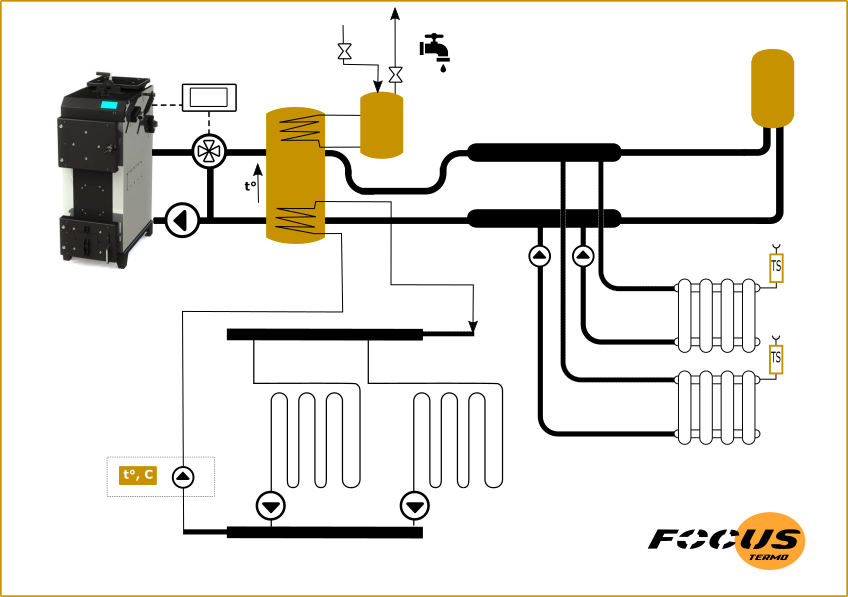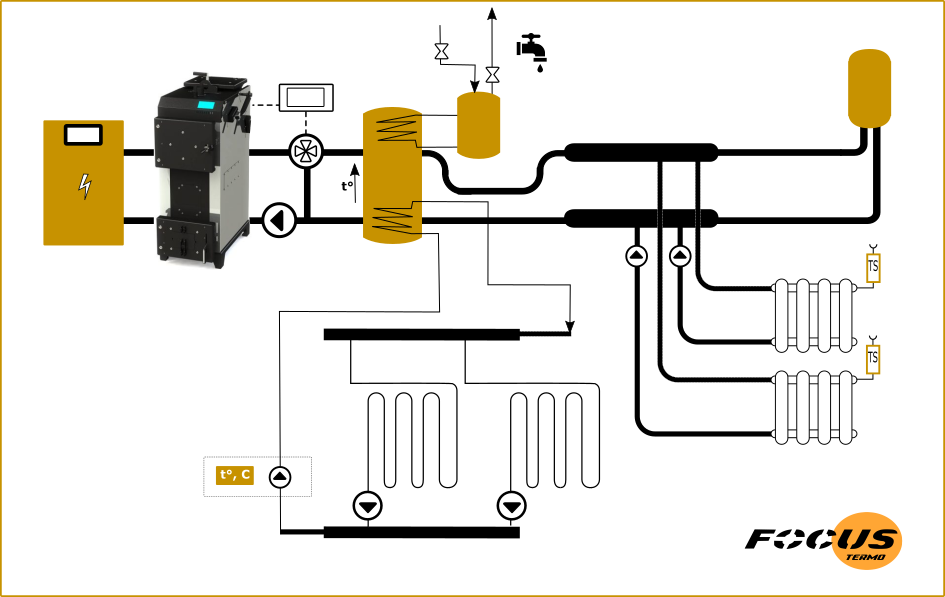Pyrolysis boiler and electricity for heating a small private house
Creative solutions for heating your home will help you save on operating costs by having a completely autonomous system. A pyrolysis boiler and electricity will help bring the level of comfortable heating to gas heating at fundamentally lower costs. A pyrolysis boiler will help achieve savings of 5 times; the electric boiler will maintain the minimum temperature at home during your absence.
Why does a pyrolysis boiler save money?
Pyrolysis heating technology is a method of using solid fuels such as wood to produce heat. It is based on the process of pyrolysis, which occurs when organic material is heated without access to air. How it works:
- Pyrolysis: Pyrolysis is the process of thermal decomposition of organic material at high temperatures (usually 400°C to 800°C) without access to air or at very low oxygen levels. As a result, the material decomposes into gases, liquids and carbon residue.
- Gas release: One of the main products of pyrolysis is raw wood gas, which contains a lot of thermal energy. This gas can be used as fuel for combustion and heat production.
- Carbon Residue: Pyrolysis also produces a carbon residue known as pyrolysis coal or coal slag. This coal residue can be used as solid fuel for further combustion or as soil fertilizer.
- Application in Boilers: Pyrolysis technology is used in boilers specially designed to burn raw wood gas obtained as a result of pyrolysis. These boilers are usually equipped with gas cleaning and filtration systems to reduce emissions and improve combustion efficiency.
- Efficient and environmentally friendly: Pyrolysis boilers typically feature high combustion efficiency and low emissions, making them a more environmentally friendly option compared to some other solid fuel heating methods such as open combustion or traditional fireplaces.
- Flexibility in Fuel Selection: Pyrolysis technology allows the use of a variety of solid organic material as fuel, making it a flexible and versatile option for different regions and conditions.
Pyrolysis heating technology is an effective and environmentally friendly method for producing heat from solid organic fuel. It is widely used in various industries including industry, agriculture and domestic heating.
At home, a pyrolysis boiler ensures long-term combustion of fuel with minimal consumption. In other words, not only the fuel itself is used as fuel, but also the combustion products that are released as a result of combustion. This is very beneficial, but compared to a pellet pyrolysis boiler, it has a significant disadvantage. It requires manual downloading.

Backup electric heating
Despite the fact that a pyrolysis boiler is a long-burning heating equipment, it can still go out. Especially during the absence of the owners of the house. This is inconvenient and is a disadvantage compared to a more expensive pellet boiler, into which pellets are supplied automatically from the hopper. The solution is a pyrolysis boiler and electricity. An electric boiler can heat water in the summer and heated floors in the winter to maintain a temperature of about 12 C. It can also be programmed to raise the temperature in the room, and upon return turn on the pyrolysis boiler, which will heat at full power.
Advantage of the approach: pyrolysis boiler and electricity
The combination of a pyrolysis boiler and electrode heating can have several beneficial aspects for heating a private home:
- Energy efficiency: The pyrolysis boiler uses the principle of pyrolysis to gasify fuel, which allows efficient use of its thermal energy. The result is high energy efficiency of the heating system.
- Multifunctionality: Pyrolysis boilers can usually operate on various types of solid fuel, such as firewood, coal, peat and others. This gives homeowners greater flexibility when choosing fuel based on availability and cost.
- Low Emissions: The pyrolysis process typically produces low emissions and air pollution, making it a more environmentally friendly option than some other types of solid fuel heating.
- Hybrid System: The addition of electrode heating creates a hybrid heating system that can operate in different modes depending on needs and conditions. For example, electrode heating can be used as an additional heat source during periods of extremely cold weather or to maintain a comfortable temperature in individual rooms and off-season when the main boiler is not working.
- Control and Control: Electrode heating is usually easily controlled and controlled using thermostats and automatic control systems, providing precise temperature control and energy savings.
- Backup source: Electrode heating can be used as a backup heat source in case of failure of the pyrolysis boiler or temporary lack of available solid fuel.






